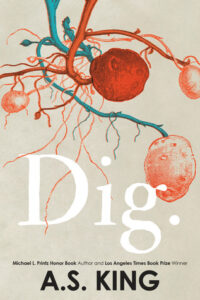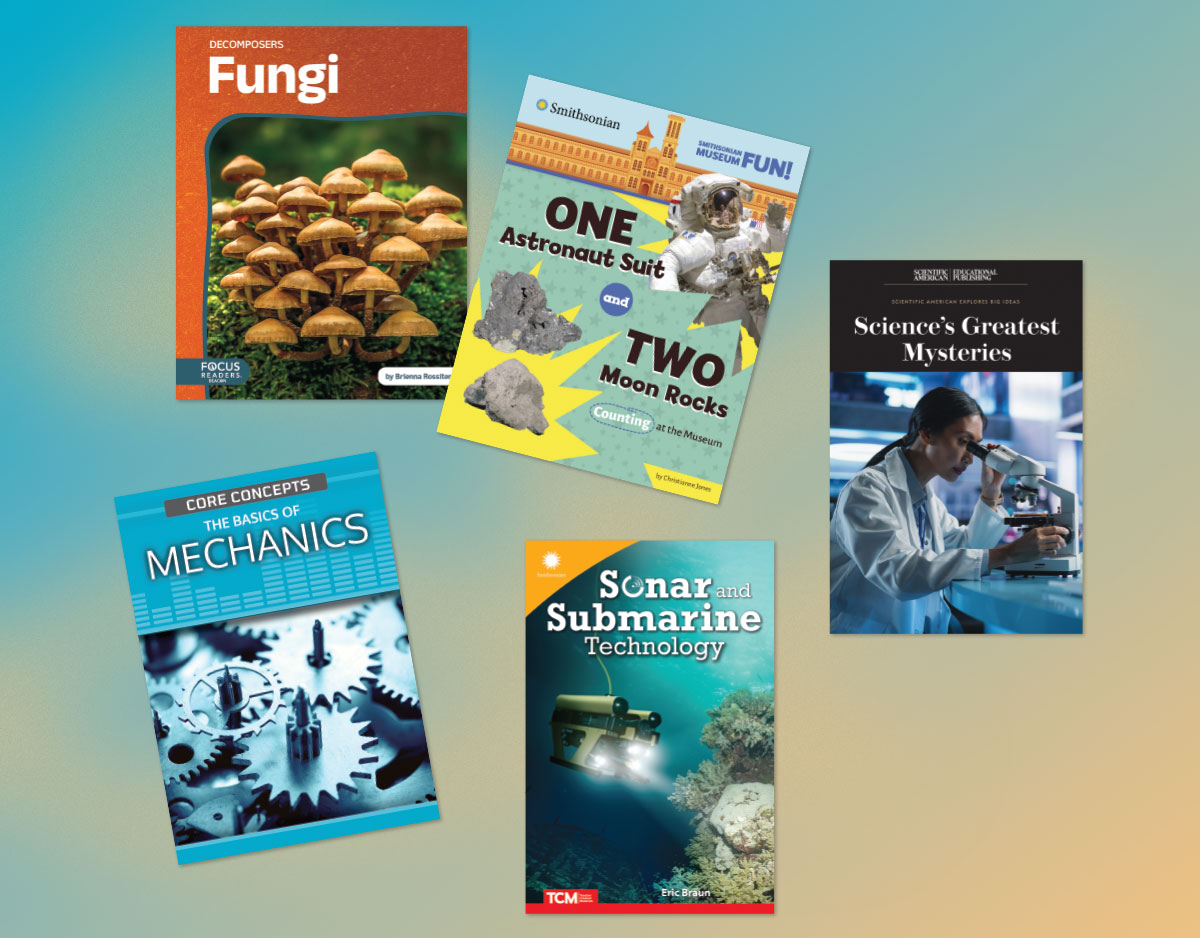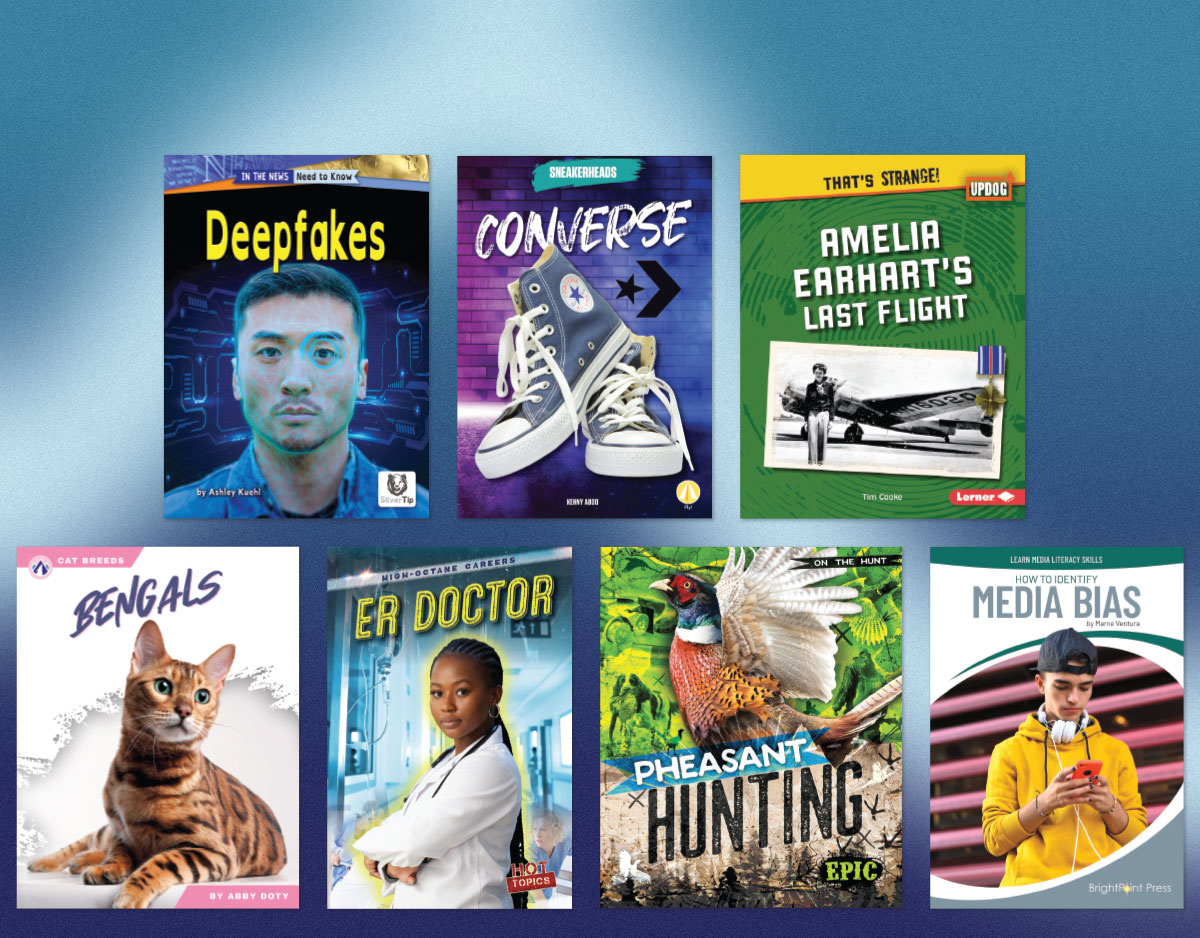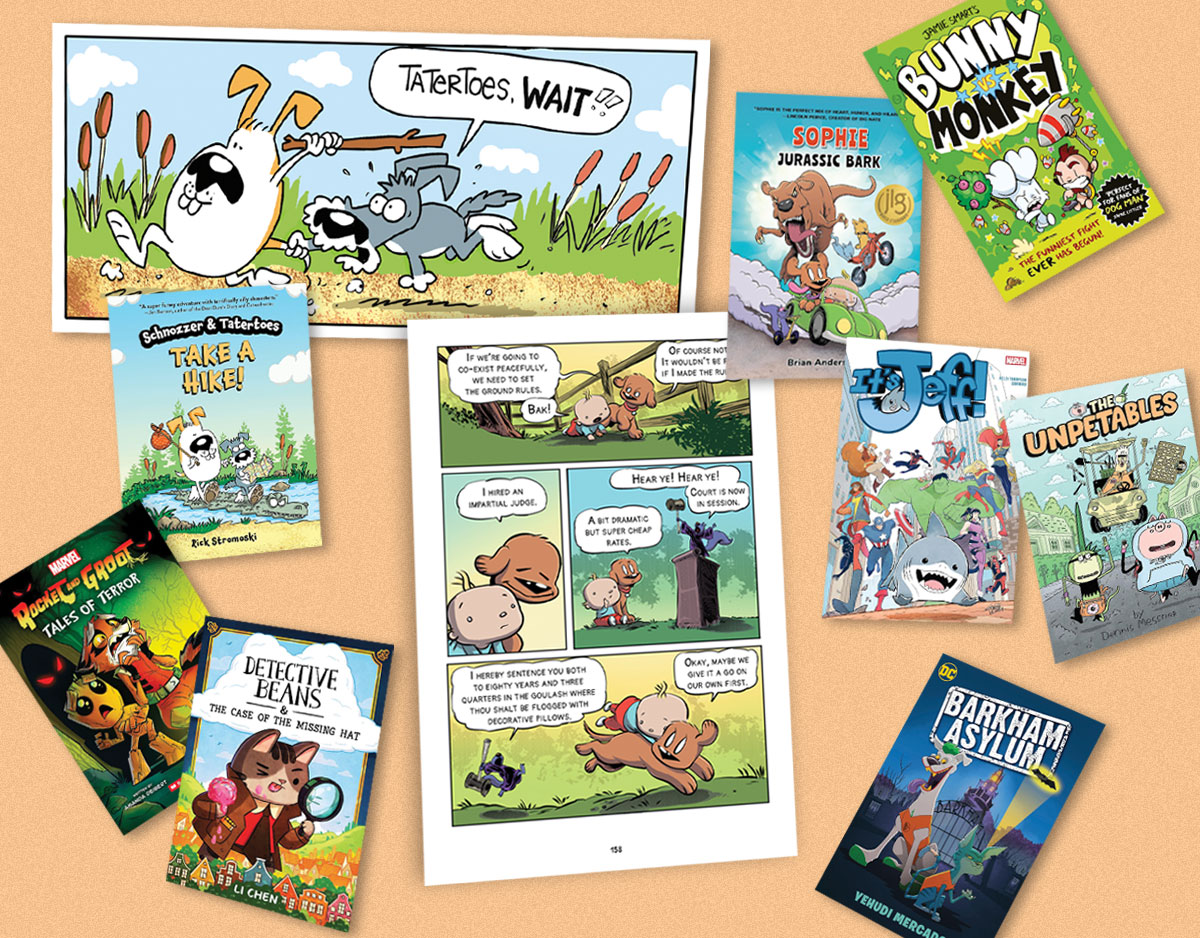Book Review: Dig by A. S. King, an important reflection on white privilege in YA literature
Acclaimed master of the YA novel A. S. King’s eleventh book is a surreal and searing dive into the tangled secrets of an upper-middle-class white family in suburban Pennsylvania and the terrible cost the family’s children pay to maintain the family name.
The Shoveler, the Freak, CanIHelpYou?, Loretta the Flea-Circus Ring Mistress, and First-Class Malcolm. These are the five teenagers lost in the Hemmings family’s maze of tangled secrets. Only a generation removed from being simple Pennsylvania potato farmers, Gottfried and Marla Hemmings managed to trade digging spuds for developing subdivisions and now sit atop a seven-figure bank account, wealth they’ve declined to pass on to their adult children or their teenage grand children. “Because we want them to thrive,” Marla always says. What does thriving look like? Like carrying a snow shovel everywhere. Like selling pot at the Arby’s drive-thru window. Like a first class ticket to Jamiaca between cancer treatments. Like a flea-circus in a doublewide. Like the GPS coordinates to a mound of dirt in a New Jersey forest. As the rot just beneath the surface of the Hemmings precious white suburban respectability begins to spread, the far flung grand children gradually find their ways back to each other, just in time to uncover the terrible cost of maintaining the family name.
ADVERTISEMENT
ADVERTISEMENT
With her inimitable surrealism and insight into teenage experience, A.S. King explores how a corrosive culture of polite, affluent white supremacy tears a family apart and how one determined generation can save themselves.
This book will be released in March 2019. I read an ARC that I received via the publisher. ISBN: 9781101994917
Karen’s Thoughts:
I just finished reading an ARC of DIG by A. S. King and my mind is blown, as it always is. And I mean I just literally finished reading it. I closed the pages and had to sit down at my computer and talk about this book. It’s a little early to be talking about this book, but talk about it I must. No spoilers.
A. S. King is one of those authors that adults always say teens aren’t reading, in part because they’re always underestimating teens. They say this at the same time that they assign things in class like Kafka’s Metamorphosis or Shakespeare or Conrad’s Heart of Darkness. There is some real disconnect in the way that adults talk about teens. They often under-estimate them and have zero to little faith in them. Teens know this; they know that many of the adults who claim to love them or value them or be in the process of educating them are doing very few of those things because they don’t actually respect teens. They know this and they resent it. Yes, not all adults and yes not all teens, but on the whole, that’s been the history of adolescence. Adults complain about teens even though they did the same things as teens and we underestimate them even though we resented the ways adults underestimated us as teens and we keep repeating this vicious cycle.
Make no mistake, A. S. King writes seriously weird and trippy books. I mentioned Metamorphosis above for a reason, King does not write straightforward literature. She takes a trippy, winding path with allusions and metaphors and surrealism that takes a while to get to the point but when you get there, your mind is both blown and sure that you missed a lot of stuff along the way. You could read an A. S. King book over and over again and find something new and different every time. And you will probably walk away sure that you didn’t fully get it every time. It’s that type of literature. It’s bold and confusing and maddening and dark yet inspiring and profound and moving.
If I’m being honest, I will tell you that although I name A. S. King as one of my favorite authors, and this is a true fact, I find her books difficult to begin. It takes a while to get into the rhythm of each book, to find out what’s knitting this particular book together, to suss out what’s real and what’s not. This is true for Dig as well, it takes a while to figure out who is who and what is going on. This is part of the reason, I think, that adults think that King doesn’t write YA. And yet King really gets into the heart of what it means to be a teenager in current times. She writes teens more authentically then some of the bestselling YA authors. She isn’t an adult writing YA for the adults that buy YA, she is an adult writing YA for the teens that read YA because she cares about teenagers and the teenage experience. Teen readers feel this in the pages and relate, even when adult readers find the books unrelatable or unapproachable. When I read the thoughts and conversations that the teens have in this book, they correlate to what I am hearing my own teens talk about and in the ways that they talk about them. It’s an authentic voice captured in radically unique ways.
Now I’m writing this and worried A. S. King will stumble across this post and wonder why I keep saying that adults think that teens don’t like her work but the truth is, many YA librarians have said this to me. Every time I post about A. S. King I get emails and replies, “yes but, teens don’t really like her work” or “it’s too intellectual for teens”. I find that to be a worrisome thing for YA librarians to say, because it means from the get go we are underestimating the very people we serve.
Dig is a multi-generational novel that brings together a host of characters and talks about things like racism, abuse, family dysfunction and mental health. It introduces a bunch of incredibly weird characters who seemingly have nothing to do with a cohesive story and then it just blows your mind in the way all the pieces are woven together. Once that final piece of the puzzle is put into place, you see the complete picture and you are stunned. In some ways, this is one of her most accessible books because the topics these teens are facing are so relevant to current events and discussions. Also, some of the more surreal elements are rooted in reality in ways that ultimately make sense to the story. The part of the story that made the least amount of sense to me, that was the most confusing, became an important element of the story that really works. That’s some good storytelling.
A. S. King is also one of the growing number of authors who seek to include frank discussions about sex, sexuality and sexual abuse in their novels because they recognize that this is a very real part of the teenage years. Teens think about sex. They’re trying to figure it out. A lot of them are doing it. This is one of the few YA novels that talks frankly not only about masturbation, but about female masturbation. King’s honesty resonates with teen readers because they feel heard, valued, respected and understood. King acknowledges the truth of adolescence, which makes her books that much more authentic to teens as readers.
ADVERTISEMENT
ADVERTISEMENT
I also like that in Dig King shares a lot about the adults in these teens’ lives. They are real, raw, human and flawed, but they are there and an important part of the story. This is, ultimately, a story about family and dysfunction and secrets and finding your own way – of digging yourself out of your genes and your family history – and it is profound. That’s what all teenagers are trying to do, right? Trying to find their own place in this world, to find their own voice, to set their own path, to break free of outside expectations and desires to truly find a sense of self and future. That’s what these teens are doing, and that’s why teen readers will relate.
Some of the topics in this story that are touched on include: racism, poverty, domestic violence, death and grief, secrets, the long lasting effects of trauma, teenage pregnancy, family dynamics and dysfunction, and depression and anxiety. Just to name a few. King really asks the readers to consider things like privilege, especially economic and white privilege. Characters often talk about race and bias and privilege and I think it is valuable and needed, but also handled well in the context of this novel. Even some of the characters who may consider themselves “woke” have personal revelations that indicate that they may not be as “woke” as they seem. I hate to keep using the word profound, but I found it it to be truly profound. As someone who is also wrestling with white privilege and what it means to live in our world in 2018 and how to be a good ally, it is nice to read a book that asks me to think about these issues in real and honest ways.
I keep a journal where I write down a lot of my favorite quotes from books and I marked a ton of quotes that I will be adding to that journal. Dig doesn’t come out until March of 2019 so it’s far too early to share them with you, but I wish that I could. There are some very moving reflections on the nature of self and family that I will be reflecting on for a very long time. The Teen is currently reading this book and I’ll let you know what she thinks once she finishes.
At the end of the day, this is a book I hope that everyone will read as it genuinely asks the reader to reflect on the concept of white privilege and it does not shy away from that discussion. What other books on this topic would you recommend?
Filed under: Book Reviews
About Karen Jensen, MLS
Karen Jensen has been a Teen Services Librarian for almost 32 years. She created TLT in 2011 and is the co-editor of The Whole Library Handbook: Teen Services with Heather Booth (ALA Editions, 2014).
ADVERTISEMENT
ADVERTISEMENT
SLJ Blog Network
The 2025 Ninja Report: It’s Over
Book Giveaway: Foundling by D.M. Cornish
Ghost Town | Review
30 Contenders? Our Updated Mock Newbery List
When Book Bans are a Form of Discrimination, What is the Path to Justice?
ADVERTISEMENT








